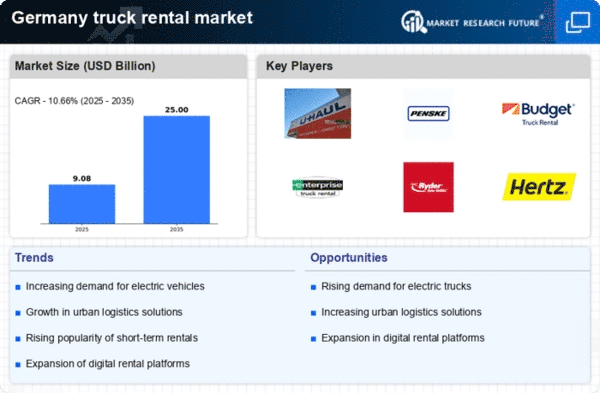The truck rental market in Germany exhibits a competitive landscape characterized by a blend of established players and emerging entrants, driven by factors such as urbanization, e-commerce growth, and a rising demand for flexible transportation solutions. Key players like Sixt (DE), Europcar (FR), and Ryder (US) are strategically positioned to leverage these trends. Sixt (DE) focuses on expanding its fleet with electric vehicles, aligning with sustainability goals, while Europcar (FR) emphasizes digital transformation through enhanced online booking systems. Ryder (US) is investing in supply chain optimization, which appears to enhance its operational efficiency and customer service, collectively shaping a competitive environment that prioritizes innovation and customer-centric solutions.
The market structure is moderately fragmented, with several players vying for market share. Key business tactics include localizing services to meet regional demands and optimizing supply chains to reduce costs. This competitive structure allows for a diverse range of offerings, catering to various customer segments, from individual renters to large corporations. The influence of major players is significant, as they set benchmarks for service quality and technological advancements, thereby impacting smaller competitors.
In October 2025, Sixt (DE) announced a partnership with a leading electric vehicle manufacturer to expand its electric truck fleet. This strategic move not only enhances Sixt's sustainability profile but also positions the company to capture a growing segment of environmentally conscious consumers. The integration of electric vehicles into their fleet is likely to reduce operational costs in the long term, while also appealing to a market increasingly focused on reducing carbon footprints.
In September 2025, Europcar (FR) launched a new mobile application designed to streamline the rental process, allowing customers to manage bookings and vehicle pick-ups seamlessly. This digital initiative reflects Europcar's commitment to enhancing customer experience through technology. By simplifying the rental process, Europcar may attract a younger demographic that values convenience and efficiency, thereby strengthening its market position.
In November 2025, Ryder (US) unveiled a new logistics service aimed at small to medium-sized enterprises, providing tailored truck rental solutions. This initiative appears to address a gap in the market, offering flexible options that cater to the unique needs of smaller businesses. By diversifying its service offerings, Ryder is likely to enhance its competitive edge and foster customer loyalty in a segment that is often underserved.
As of November 2025, current trends in the truck rental market include a pronounced shift towards digitalization, sustainability, and the integration of artificial intelligence in operations. Strategic alliances are increasingly shaping the competitive landscape, as companies collaborate to enhance service offerings and operational efficiencies. Looking ahead, competitive differentiation is expected to evolve, with a notable shift from price-based competition to a focus on innovation, technology, and supply chain reliability. This transition suggests that companies that prioritize these elements will likely emerge as leaders in the market.

















Leave a Comment